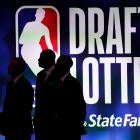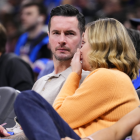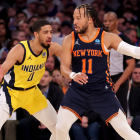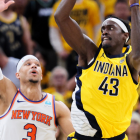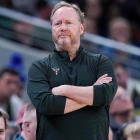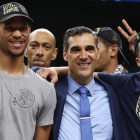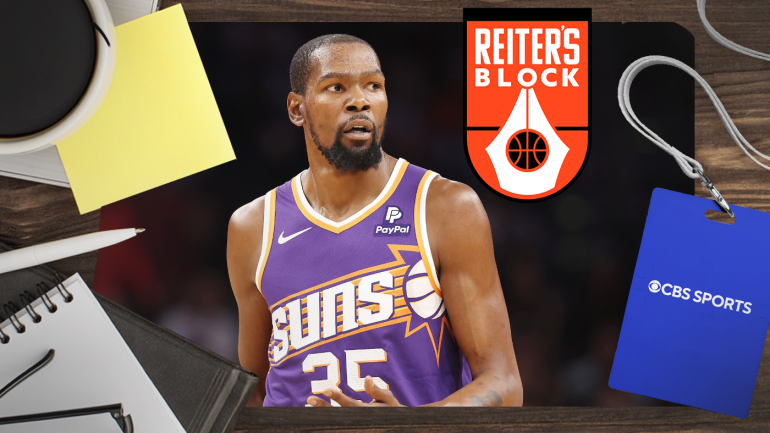
Let's jump to a way-too-early conclusion, since it'll be as true in June as it is now: The Phoenix Suns are not going to pose any real threat in the West.
That isn't just because the Denver Nuggets are clearly head and shoulders above everyone else in the conference, although they are.
The Suns' problem runs deepers.
The recent past has shown that NBA teams that hoist the Larry O'Brien Trophy in June rarely do so by executing a collect-a-bunch-of-stars-and-win-it-all strategy in the preceding 12 months. The only recent exceptions -- and he tends to be the exception to many NBA realities -- belong to LeBron James.
It's homegrown teams that have largely been champions, often with important additions and recalibrations mixed into the group. The 2018-19 Toronto Raptors come to mind as the team that most gussied up its squad, but that was still an addition to something that existed rather than a redo on the fly.
The much-heralded Suns, so far, are 3-4, and there's a malaise and general sense of doubt outside of Phoenix about the team's chances this season.
Yes, the Suns have been banged up. Yes, Bradley Beal has yet to debut in Phoenix, a significant fact that could change Wednesday night against the Chicago Bulls. And yes, Devin Booker and Kevin Durant may well be two of the best 10 players in the game, a reality that always gives a teams fighting chance come the playoffs.
But there's a fallacy built into the very core of this team: That in the NBA you can construct a successful contender the way Suns owner Mat Isbhia has tried to, by cobbling together as many stars as you can acquire.
And that's before you count the Suns defensive deficiencies, the uncertain fit of a KD-Booker-Beal triumvirate, a lack of depth and the legitimate injury concerns and history associated with each of those three stars.
And then there's trying to cobble together a bunch of All-Stars and assume that equals a champion.
That approach didn't work in Brooklyn with KD, James Harden and Kyrie Irivng. It hasn't worked for the Clippers with Kawhi Leonard and Paul George, and there are no guarantees it gets better now that Rusell Westbrook and Harden have been thrown in for good measure. It didn't work in Philly with Joel Embiid and Harden, in Houston or Oklahoma City when they tried it with some Harden-Westbrook, Harden-CP3 or George-Westbrook combos. And it isn't going to work in Phoenix, either.
"You have to build teams," said one executive who's been part of a championship front-office. "You need stars, but you need a team around them, and a culture, and an identity. Phoenix [this year]? No way. They threw them together. It won't work."
The Warriors and their four championships are homegrown. Durant was a huge part of two of them -- and he earned two Finals MVP Awards for his efforts -- but he was a critical supplement, a booster to an already well-made machine, not a creator of something new and brilliant. He went to the Warriors to help them stay atop the mountain, not to help them make their first ascent.
The Celtics, clearly the best team in the East right now, are largely homegrown, too, even if this incarnation is ringless, at least for now.
Jayson Tatum and Jaylen Brown were drafted there and have spent years in Celtics green, and now that front office has swapped in new players, most notably Kristaps Porzingis and Jrue Holiday, to try and get over the hump. But the core of that team hasn't changed, and the project is years in the making.
The Nuggets won last year with largely players they drafted and a core that learned to lose, win, suffer and play together. That, too, took years. The Milwaukee Bucks had a similar path a couple years ago. That Raptors team that beat the Warriors in the 2019 Finals did bring in Leonard, himself a previous Finals MVP, to get to the glory.
But unlike in Phoenix, Toronto didn't blow things up and start over with one homegrown star. They had a group that had played together, that had made it to a conference finals, and then swapped Leonard in for DeMar DeRozan. The Spurs' dynasty was fueled on homegrown talents and a clear culture built by years, not recruiting dinners. And the Heat's championships were a result of that Heat culture -- and, in 2012 and 2013 -- that LeBron James exception.
LeBron is the exception to this rule in the modern game. He formed a superteam in Miami and made four consecutive NBA Finals, winning two of them. He also learned to win there. Then he went back to Cleveland, where they shipped out Andrew Wiggins to bring in Kevin Love, and had more success and another championship in a cook-now, win-now atmosphere. Then he did some more of that swipe-right approach to team building in LA, this time with Anthony Davis as his co-star.
But LeBron is a generational talent and generational exception to all these rules. The last team without LeBron to really star-collect, and win, was the 2008 Boston Celtics. And they got only one ring, a vast underachievement considering that roster.
Durant is sensational, but he's not LeBron James. If KD were enough to carry poorly-constructed-but-uberly-talented teams to championship glory, like LeBron has, he'd have won in Brooklyn. And Oklahoma City. And somewhere other than Golden State when he left the Thunder.
It's OK not to be LeBron James. Only one guy is. But if you don't have him, you're going to want to build your team the way they have in Denver, Boston, Golden State, Milwaukee or Miami: Patiently, with some skill and luck, and with as much of an eye toward culture and identity as simply amassing massive talent and hoping it works.
The Suns are very talented. The Suns are going to be very fun to watch. And the Suns are likely to be, once fully healthy and fully in the swing of things, exactly what they are now: The latest superteam to come up short.
Anyone want to tell Curry his window is closed?
One thing you hear a lot across the NBA is that the Golden State Warriors window has irrevocably closed.
Tell that to Stephen Curry.
It's early, but already the Warriors look sharp and dangerous. They're 6-2, their defense looks better than last season's, and there's no clear challenger to the Nuggets in the West, giving Golden State plenty of space to fill that void.
And they have Steph.
He's averaging almost 31 points per game. He's shooting 53 percent from the field and an astonishing 47.5 percent on three-pointers. He's led the Warriors in scoring each game early in this season.
There are certainly holes in the armor in Golden State, and plenty of NBA scouts and executives will wax poetic if you ask them to about why the Warriors aren't built to win now: How they squandered past draft picks, how Klay Thompson and Draymond Green can't help carry this team when Steph tires or simply needs help, why the win-now-while-rebuilding-as-you-go approach attempted by former GM Bob Myers came up short, why being overly dependent on Curry is too fraught a plan given he'll turn 36 later this season.
But, at least so far, the counterpoint has worked pretty well: That Golden State has Steph Curry, that's simply enough.
My MVP ballot is a battle of the bigs
I've had an official MVP vote the past few seasons, and several over the past decade. This season, as promised, we'll check-in on my ever-evolving ballot. Here's a look almost 10 games in.
- Nikola Jokic. Up one spot from the preseason rankings. Denver has the best record in the NBA at 8-1. He's still a monster, and the award he probably should have won last year may not be so elusive this time around.
- Joel Embiid. Onto the list for the first time. The Sixers have looked just fine, thank you very much, without Harden, and Embiid has been a huge part of the reason why. His 48 points against the Wizards the other night also felt very, very on brand -- a stark "I'm the guy" moment like so many that snagged him the hardware last year.
- Stephen Curry. Also first time on this list after being left off the preseason predictions. More than ever -- and that's saying something -- Curry's value to the Warriors will dictate the team's season. Their window, closed or otherwise, revolves more and more around him. So far, so very good.
- Luka Doncic. Perhaps he's unfairly low here, having dropped from No. 3 last time around. He's certainly the primary reason the Dallas Mavericks are 6-1 and making Dallas doubters (myself included) blush.
- Jayson Tatum. Down from No. 4. The Celtics and the Nuggets are the cream of the crop in the NBA right now, and Tatum is Boston's best player. His new teammate, Porzingis, stole a little of his thunder this time around, but it's still Tatum's team.
Dropping from the list: Durant. On the fringes and new to the mix: Porzingis, Tyrese Maxey and Anthony Edwards.














